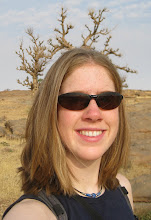Written in September 2010
My second Ramadan in Mali has come and gone by now. We celebrated “selifitini” last Thursday. I feel a little weird writing about Ramadan since I am not a Muslim. But, I realize that I probably know more about Islam than 90% of people who read my blog, so anything I can share might be helpful for creating a better environment for understanding, especially in the United States where Islam has tended to be represented in a negative manner as of late. So, with that said, here's my attempt to explain what I have come to understand from one year of living here. Ramadan, or “sunkalo,” is a month of abstaining from food, water and sex during the daytime hours for Muslim people. This fast represents a sacrifice for Allah, and a month of reflection on Allah and your relationship to him. I noticed that men in my village spent far more time praying during this month than I normally see.
I did not participate in the fast for various reasons – mostly the fact that I am training for a half-marathon, and on a normal basis can hardly make it through the heat of the day without a liter of water at lunch time. That's part of the sacrifice though, to do something in the name of God. My friend told me, “Fasting is more difficult that running...so you should fast.” Perhaps, but not being a Muslim myself, you could say my participation might demean the sacrifice that so many people around me were making.
My two host mothers were not participating (one is pregnant, and the other gave birth recently), and neither were their husbands. But, I did notice that our food was much better than usual (this, I think, is my opinion only...but they regularly made foods that we've rarely eaten during the rest of the year).
It is interesting that Sunkalo/Ramadan coincide with the rainy season this year and last. Rainy season is known as the hunger season in Mali because people's crops are in the ground, but have not yet matured. Last year's food stores are dwindling or gone. And money, which is mostly earned from farming and/or hot season labor, is running short. So, people have no money with which to supplement their food stores. Even if you have money, it's hard to get good food in village right now – for awhile the only vegetables available were leaves from the forest, hot peppers and a local eggplant variety.
Even with the hungry season in effect, we had delicious food to celebrate the end of Ramadan last week. Unfortunately, people did not know until 3 AM the morning of Selifitini that the celebration would take place. “Officials” in Bamako were waiting to see the moon (the phases of the moon are the basis of the calendar used here, and therefore determine when the month of fasting begins and ends); they did not see the moon until 3 AM. In fact, I had promised to fast the last day of the month, which everyone expected to be Thursday. When I showed up at my homologue's house at 4 AM to prepare for the fast, she looked at me and said, “Sunko banna, sun te ke bi. Taa k'i da.” (The fasting is over, there is no fast today, go back to bed). Because the moon wasn't seen until 3 AM, people complained they did not have enough time to prepare the feast well. At any rate, I thought my host family made the most delicious okra sauce we've had in awhile (some will be surprised that I just called any sort of okra sauce delicious), and they gave me more meat than I've had from them in my entire last year of meals with them combined! And, we ate that way for 2 days! In some ways, I think of that feast as a respite from hungry season. Everyone was able to eat vitamin-rich, protein-filled food for two days, hopefully adding to their health to help get them through rainy season.
After lunch, I walked around village greeting every person I know. Blessings for the long lives and health of our parents, brothers and sisters, children, hosts, etc. were exchanged. One of my favorite blessings is, “San mana keme bo, an ka je ka seli nogonfe.” When 100 years have passed, may we celebrate this day together again. Amiina.
Disclaimers: Lots of pictures from this day to come, ni ala sonna.







